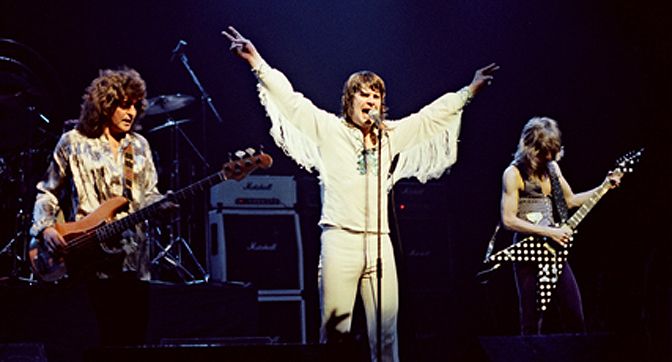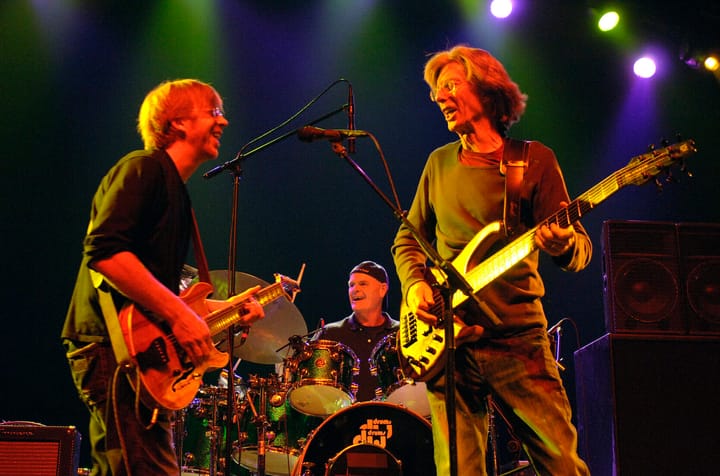Who really wrote Ozzy's "Blizzard of Ozz" and "Diary of a Madman"
Osbourne's wild antics and powerful vocals have made him a legend in the music industry. However, there is a lesser-known figure who played a pivotal role in shaping Osbourne's solo career: Bob Daisley.

To fully comprehend the significance of the reissues, we must first acknowledge the original releases. "Blizzard of Ozz" and "Diary of a Madman" were groundbreaking albums, showcasing Ozzy's distinct vocal style and the exceptional guitar work of the late Randy Rhoads. These albums catapulted Ozzy's solo career, establishing him as a force to be reckoned with in the rock world.
The Disputes and Revisions:
These albums controversially re-released in 2002 with the original bass and drum tracks replaced by newly recorded parts from bassist Robert Trujillo and drummer Mike Bordin; however, the original bass and drum tracks were reinstated for the 2011 release due to public outcry. However, as time passed, disputes emerged regarding songwriting credits and unpaid royalties. Bassist Bob Daisley and drummer Lee Kerslake, who played on the original recordings, found themselves embroiled in a bitter conflict with the Osbourne camp. Their contributions were erased from the 2002 reissues of the albums, replaced by different musicians.
In the annals of rock and roll, few figures loom as large as Ozzy Osbourne. Known as the "Prince of Darkness," Osbourne's wild antics and powerful vocals have made him a legend in the music industry. However, there is a lesser-known figure who played a pivotal role in shaping Osbourne's solo career: Bob Daisley.
In 1980, following his departure from Black Sabbath, Osbourne was in the process of assembling a new band. He recruited Bob Daisley, a seasoned bassist and songwriter, to join his new venture, originally named "Blizzard of Ozz." Daisley's contributions to this band were significant, yet they have often been overlooked in the narrative of Osbourne's success if we are to trust his word, which I am inclined to, given the difference in the albums that he is not on.
When the debut album was released, it was credited solely to Ozzy Osbourne, and "Blizzard of Ozz" was relegated to being merely the title of the album. This was a surprising development, considering Daisley's substantial contributions. He not only provided bass and backing vocals but also played a crucial role in the songwriting process. Daisley was the creative force behind eight of the nine tracks on the album, a fact that is often overshadowed by Osbourne's larger-than-life persona.
The follow-up album, "Diary of a Madman," saw Daisley continue to play a significant role in the creative process. He wrote most of the material for the album, further solidifying his position as the backbone of the band's musical output. However, in a shocking turn of events, both Daisley and drummer Lee Kerslake were fired before the album was released. This decision was met with controversy, as it seemed to dismiss the significant contributions both musicians had made to the band.
Bob Daisley: A lot of the songs were instigated by Randy, and then mostly he and I would sit on chairs opposite to one another and work out parts for the overall song. Randy wrote a good portion of the music, but he didn’t do it by himself – it was both of us working together.
Obviously, the vocal melodies came from Ozzy, but the instrumentation came from Randy and me first. Ozzy would sing a melody over what we had, and because Ozzy – for the most part – is not a lyricist, he would usually sing just nonsensical lyrics, just anything that came into his head. Sometimes the lines he came up with or little phrases would inspire me to write a particular lyric, but I wrote more than 90% of the lyrics for all those songs.
In fairness to Ozzy, some of my lyrics were instigated by a lot of his melodies and some of his nonsensical lines, and that was part of our process. I would write the lyrics last because the music would create a mood to sort of lend itself to what I was going to write about. Everything had been written for Blizzard of Ozz before Lee came in, but then even Lee came in on the music when we were writing for Diary of a Madman, along with some of the vocal melodies. But I co-wrote the music and all the lyrics for those albums.
The Removal of Daisley and Kerslake:
The decision to remove Daisley and Kerslake from the reissued albums was met with widespread criticism from fans and music enthusiasts. These original recordings had a unique chemistry and energy that couldn't be replicated. The absence of Daisley's bass lines and Kerslake's drumming altered the overall sound and feel of the albums.
The 30th Anniversary Box Set:
In recent years, the 30th anniversary box set of "Blizzard of Ozz" and "Diary of a Madman" sought to rectify the previous revisions. The box set aimed to restore Daisley and Kerslake's original performances and provide fans with a more authentic listening experience. While this was a step in the right direction, some felt that the bonus material included in the set was lacking, failing to fully capture the essence of the creative process behind these albums.
The Impact on Legacy:
The controversies surrounding the reissues have undoubtedly left a mark on Ozzy Osbourne's legacy. The removal of key musicians and the disputes over songwriting credits have sparked debates among fans and music historians alike. However, it is important to recognize that the original releases of "Blizzard of Ozz" and "Diary of a Madman" remain groundbreaking achievements that continue to inspire generations of musicians and fans.
The Formation:
Sharon Osbourne is quoted: “Kerslake and Daisley stuck together in the band because they were the last two in, so to speak…they were session guys who could come and go.”
BD: No. It’s ridiculous for her to say we were, “the last two in, so to speak.” Ozzy and I started the band, and when we did, he hadn’t even mentioned Randy Rhoads yet. I’ve kept diaries since the beginning of 1976, so I’ve got every single event and date, and who did what, written down.
This is what happened: Ozzy came back to England after being fired from Black Sabbath, and he had seen Randy Rhoads in L.A., but they didn’t get a band together before he came back to England. David and Don Arden, Sharon’s brother and father, were managing Ozzy and were going to manage the new band. I went up to Ozzy’s house after we met and it was there that we started the band. Ozzy had two other players and I said to him, “These guys ain’t world class,” so he got rid of them.
That’s where and when he told me about Randy – this kid he met in L.A. David Arden didn’t want to fly Randy over and said that nobody’s heard of him – he’s an unknown. But eventually he agreed and said, “This is against my better judgment flying Randy over.” And then the band was Randy, Ozzy and me, and that’s how the band was started. We then auditioned loads of drummers and finally got Lee at the end.
Conclusion:
The history of Ozzy Osbourne's reissues is a testament to the complexities and challenges faced in preserving the legacy of iconic albums. While the controversies surrounding the removal of Daisley and Kerslake may have tarnished the reissued versions, it is crucial to celebrate the enduring impact of the original recordings. "Blizzard of Ozz" and "Diary of a Madman" continue to stand as monumental achievements in Ozzy's career and in the annals of rock music, reminding us of the power of collaboration, creativity, and the resilience of artistic expression.



Comments ()